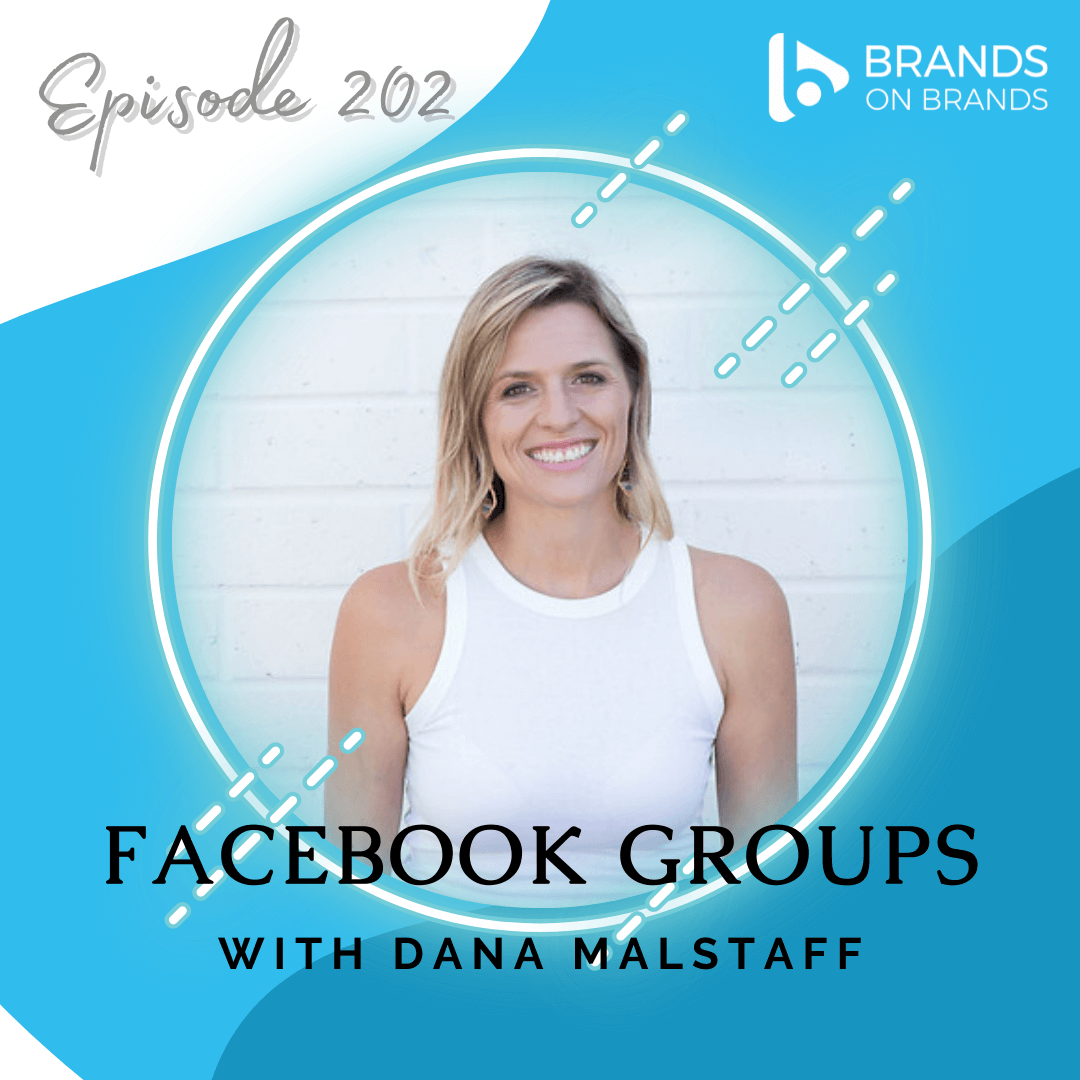Discover why leading a community is so important with Dana Malstaff of Boss Mom, a 50,000+ person Facebook group. Building a community around your business is important not only for revenue but also for your entrepreneurial soul!
Dana wrote her first book in 2015 called Boss Mom, The Ultimate Guide To Raising A Business And Nurturing Your Family Like A Pro. She also launched a movement where she brings business owner moms together to talk about how to grow their business the right way, how to nurture leads, how to build awareness in their business, and more.
How do you build a Facebook group that is alive and being nurtured, where the community is leading the conversation and is active in a good way?
If you’re building your first community, how do you get started and where do you find people to join your Facebook group? What do you post to keep people engaged? That’s what we talk about today.
WHY BUILDING A FACEBOOK GROUP IS EFFECTIVE
Brandon Birkmeyer: [00:03:11] You’ve managed to beat the odds and create something that not a lot of people can attest to, which is a large community of people. The last time I checked it was above 50,000 people. Why is building a community such an effective approach to growing your business?
Dana Malstaff: [00:03:44] Well, I would say business is people. If nobody is buying your stuff, then you just have a hobby. Community is there whether you choose to manage it and cultivate it or not.
If you’re not cultivating a community, then the places where you’re getting clients means that you’re doing ads or more traditional digital marketing and all of those things. That’s not bad, but I tell people I’m inherently lazy, which is a little bit of a joke.
I think I work my butt off, but only as much as I have to. If I don’t have to work 14 hours, I’m not going to work 14 hours. When it comes to community, you can leverage other people to be your marketing and your sales force while also lifting them up at the same time and creating a really fruitful space for everybody.
To me, that makes it more cost-effective, more fruitful, and impactful.
YOU GROW AS A LEADER
It does take a little bit more mental strength to be a leader, but I would challenge anybody who wants to be the CEO of a company should try to be able to run a community. If you plan on having employees, you are running a community there.
There are all sorts of instances where you have opportunities to lead. I think the test of growing something beautiful like a community can not only change how meaningful you feel like your life is. It can also grow your business at the same time and give you invaluable skills.

As you’re getting older and wiser, you realize that we’re all people running around, bumping into each other. The more you can guide that in a really meaningful way, I think the better we all are and the more successful we’ll be.
I think it’s important too that everybody should recognize that being an entrepreneur, (making content, putting things out there, staying up till the middle of the night, recording podcasts,) it’s hard.
AVOID BURNOUT
It’s hard and let’s be honest, half the time we’re thinking about that Netflix show that we wish we were binging right now. We want to be taking a nap, or hanging out with our family. But we are drawn to create, to solve problems. That’s hard.
We also are very rarely surrounded by all of the right people that make us feel loved. In fact, even our kids and our spouses half the time aren’t good at making us feel loved. We are probably the same way there because we all get into a logistical rut.
I’ve got to run things, get this podcast out, take my kids to school, et cetera. What we find is we are just burning the candle, not even at both ends. You’re just burning the candle.
It’s getting lower and lower, which means that a lot of people just give up. They don’t grow something the way they could. They don’t make the revenue for the freedom that they want or whatever that is.
THE FACEBOOK GROUP COMMUNITY WILL FULFILL YOU
When we start to build a community, then we find fruitfulness outside of just the revenue. It also feeds the revenue because you get what I call an Appreciation Loop.
I want every single week for more than one person to message me and say, “This is exactly what I needed this week. This is exactly the training, the permission, or the care or somebody listening to me that I needed. I needed that help to get those two extra followers because it was meaningful for them.”
I think when we start to see that Appreciation Loop come back, then we start to feel fulfilled in not just the fact that we made good content and we’re smart people solving problems, doing things, and growing revenue, but we’re actually impacting other people by what we do.
That’s why I’m always baffled when people don’t ask for testimonials. If someone replies to one of my auto emails and they say, “Oh, I just want to tell you I’m excited to be in the community,” or they tell me a fun fact about themselves, I one hundred percent of the time email them back.
I’d say, “Yay, I’m excited about this! By the way, how are you liking our membership? What is your favorite part or least favorite part about the group and how can we improve? What are we doing that you love?”
YOUR BUSINESS WILL LOVE YOU BACK
The replies I get back and the messages I get are the fuel that I need to stay up till two in the morning and get that one thing done or to go that extra mile when I don’t have to for the community.

Those are the things that create loyalty, but they also create loyalty for you in your own business. Let’s be honest, I love dating analogies. We cheat on our businesses all the time. It’s just because we’re not committed in a lot of ways because it’s not loving us back.
A community is a way to help us create a business that loves us back and makes us feel valuable. I think we should not discount how much of our emotions and our brain drives our ability to be productive.
CHALLENGES OF A FACEBOOK GROUP AND COMMUNITY
Brandon Birkmeyer: [00:08:44] Why are Facebook groups or communities in general so difficult to successfully create for so many of us?
Dana Malstaff: [00:09:20] I think it’s naturally how we think as humans, especially entrepreneurs, to say, “I am a solopreneur.” That should not be a prideful comment by the way. You don’t want to be a solopreneur, you want a team.
You want to be good at what you’re good at and then delegate to other people that are good at what they’re good at. Have a team mentality.
Every movie you’ve ever watched where somebody tries to do it alone and they fail, the lesson is “Count on your team members.” I think what we do is we have the chip on our shoulder and we say, “Oh, well, I am the end-all-be-all, the leader. I am at the top.”
What people do is they go into a group and say, “I’m going to approve everybody’s post so that I can make sure it’s good. And I’m going to train all the time so that I can make sure they’re learning from me.”
IT’S NOT ABOUT YOU
I think what community has to be is you taking yourself out of the center. The moment you’ve created a community is the moment that it doesn’t need you anymore. Now it wants you around because you’re a good leader.
If it doesn’t want you around then that’s a whole different ball game that you should consider. Most of the time when you build the right kind of community, it is not about you teaching them. It is not about you disciplining them. It is about creating safe and logical boundaries so that they have the freedom to play.
If it’s a running club Facebook group, you’re the place they think of when they say, “I need a new pair of tennis shoes. I just did this great run. I’m having a challenge with shin splints.” You’re the group they go into because they know what they’re getting out of it.
They know what they can and can’t do in that group and feel safe because you are protecting them in that space. Someone did a study where they brought a bunch of dogs with their owners to a park. It was just a completely open space and the dogs did not leave the humans.
They did a different one where they took them to the same park, but they put up a fence. The dogs played all over the place.
BOUNDARIES CREATE FREEDOM
When we give great boundaries, we think we’re keeping rules and it’s going to be bad. However, what you do is you create freedom for people because they know very clearly what they can and can’t do. Then those people start monitoring for you because they want to keep that place safe too. They want to keep the culture.
I have somebody who just started this in their Facebook group of setting the right kind of rules, making sure there are good boundaries that are clear to everybody and then helping teach everybody, not your expertise, but how to follow these rules and what they can do.

We have units that say, “Hey, you can’t post outside articles because that’s not useful. It doesn’t get engagement. You can’t do these certain things, but you know what you can do is ask these kinds of questions and support in this kind of way.”
The person that just messaged me got our little course on how to start a Facebook group and started to go through it. She just started putting in the rules and has a couple of thousand people in her group.
She wrote, “Our engagement is up 50% and now people are starting to flag things that don’t fit. Now, because people aren’t seeing the wrong things all the time, (and then thinking that’s what they should be doing) people are starting to post the right things.”
YOU HAVE TO CURATE THE RIGHT POSTS IN YOUR FACEBOOK GROUP
People will follow what other people are doing. When you get the right posts, other people start posting the right things. Then it becomes this engine that goes.
We get about a hundred people per day asking to join the Facebook group. 80 people per day are given to us free, recommended from Facebook because we’re looked at and we’re seen as popular. Of course, you want to join this group.
We have 70% of the 50,000 people in our Facebook group engaged every single month. We get about 5,000 posts, about 200,000 comments.
HAVE INTENTIONS BUT BE FLEXIBLE
Brandon Birkmeyer: [00:13:03] You’ve created something very special there. I like the idea of having boundaries. You’re setting the intention for the Facebook group. I agree with that, but I think there needs to be some flexibility in that too. Would you agree?
Dana Malstaff: [00:14:13] Absolutely. We’d actually had a conversation about six months ago with my team where I said I feel like our admin group is kind of deleting to delete. We’ve gotten a little delete-happy.
That did end up coming to a place where there was an issue. People don’t like their stuff being deleted and you need to be able to explain to them why.
ALLOW EXCEPTIONS IN YOUR COMMUNITY
We don’t allow people to do intro posts for us. We have 50,000 people, and it’s a hundred people a day. It would be insane. We don’t allow it, but one person was really creative with it and she did this little dance while she was in there.
I wrote in the comments and said, “Just, so everybody knows, we don’t allow intro posts, but I have to keep this because I’m so entertained by it that you get a pass.” I always tell everybody if you do it well enough, we will let it go in there. We take it case by case. Do we keep it, do we not? Does it count? We have those discussions.

People ask me, “Yeah, but isn’t that exhausting?” And the answer is absolutely not. Every once in awhile, maybe, but absolutely not. If you’re the dictator of a group where you’re the one that has to post, and you’re the one that has to train to get engagement, that’s exhausting.
I have to look like a teacher would at what people are creating and make decisions about what we’re going to do with it. Celebrate it, delete it, let them know, try and guide them and teach them, that’s what a leader does.
That is very fruitful because sometimes I’ll message somebody and say, “Oh, we don’t allow this, but here’s another way you could do it.” People have messaged me and said, “Dana, I got this thing deleted. How do I make it better?” I openly give them my time and it’s very fruitful.
It doesn’t feel taxing when the goal isn’t simply just to regulate but the goal is to facilitate and help people grow while you grow.
DISRUPTION IS A LEARNING OPPORTUNITY
Every time we have an upset in the Facebook group, it is a learning opportunity. It is not bad, it is a learning opportunity. Anytime there is an upheaval or a concern or a trend or something like that, and it feels disruptive, it is always an opportunity.
I think everybody should think of it like that. Disruption is an opportunity. For those of us that look of disruption as chaos and disarray, we don’t know what to do with it. Everything must be falling down, so I’m going to go and burn it all to the ground.
That’s the wrong way of looking at anything. We’re all going to fail as entrepreneurs, probably weekly, right? We’ve all had launch that went bust. We’ve all had a collaboration that we thought was going to be the thing but it yielded absolutely nothing.
It is the same in the community. There is always an opportunity for failure and disruption. If we see those as opportunities, then growing a community and growing your business will always feel fruitful.
It’s like a growing pain that helps you get better and helps you get taller (proverbial taller). I think that’s how we need to look at it.
FACEBOOK GROUP BOUNDARIES CLARIFY YOUR MARKET
Dana Malstaff: [00:18:17] I tell you this though, how we tell people is way less difficult than you would think. If people are spamming all over the place, that’s because they made the group and nobody’s watching it. It doesn’t cost a lot. You can actually have the members watching it for you. There’s a methodology that is way easier than you think.
Here’s the biggest thing. This is from business marketing and everything. I’m sure you see this all the time. People are confusing the market.
If you walk up to a restaurant and it just said “some food” on the front, you would think, “Well, I don’t know what I’m craving. I was kind of craving Italian. Is there Italian in this restaurant? I’m not sure.”
If you were walking up to a clothing store and it just said “stuff for people”, you’d think, “Hmm, is that my style? We don’t know.”
RELATED: Build your personal brand with the Content Marketing Starter Guide.
WHAT IS YOUR FACEBOOK GROUP ABOUT?
There are Facebook groups everywhere that may have named their group, but their content in no way makes it clear what people are going to get or what they’re going to do in the group.

If you have a health and wellness Facebook group for women, then do you want to be the kind of place that has reviews? Do you want to be the kind of place where they find content, where they tell you what their favorites are, where they commiserate over things?
We want to be a think-tank. You have nowhere else to market research better than you have here in this space with these women. It is helpful to ask those questions, even if you’re in a group that’s not yours.
I just popped up the profile of a girl in the group that made an interesting comment, and looked at the comments that she’d done the last six months.
I could not tell from anything she posted, any question or any comment she had, what her business was, and what she was good at. Everything was so across the board on the way she was asking her questions. I had no idea.
If you’re in another group doing that, you are confusing the market. You’re never going to become micro-famous in any space where it actually becomes beneficial for you to be engaging in that Facebook group from a business standpoint.
DON’T LET YOUR MEMBERS FORGET ABOUT YOU
If your group goes in and it is not wildly clear once they get in the kinds of things that are okay to post and the kind of questions that people are asking, then they’re going to be confused.
What they’re going to do is, they’re going to close that group. Like the rest of us, they are going to go make dinner, they’re going to go through their life and have forgotten you. Nothing is going to jog their memory to say, “I need to ask that in this Facebook group because this group is the place to ask that thing.” Does that make sense?
HOW TO CREATE A FACEBOOK GROUP
Brandon Birkmeyer: [00:20:48] It does. It goes down the right path of where I was hoping to take this, which is a lot of people are trying to figure out how to create the right group. How do you approach creating Facebook groups?
Dana Malstaff: [00:21:30] There are a couple of things. One, naming a Facebook group is just like the way you would think of SEO for naming a blog, podcast, or anything else. You want to be more functional than clever. In fact, like Stephen King’s quote, (my dad’s favorite quote growing up,) which is “You kill your darlings.”
Anything that you think is brilliant, just get rid of it because you’re the only one that’s going to think it’s brilliant. It’s the same thing for words; you use words that people are looking for. If it was served up to somebody, they would go, “Ooh, that’s me.”
THE NAME SHOULD SPEAK TO THE FUNCTION
It’s smart to have the function, what they would want to know about plus who they are. For us, Boss Moms works because parenting is who they are, and they’re someone who’s trying to start a business.
Now, do we get women who haven’t started businesses yet and just think “boss moms”? Of course. You’re totally going to always get 20% of people that are a horrifyingly, terrible fit for your group. However, they’re going to naturally just go away because they’re not going to find value in your Facebook group or they’re going to get kicked out.

You can’t be perfect, but if you are helping agency owners with digital marketing, don’t stray too far from telling people in the title that you’re a group for agency owners who want to learn digital marketing. I think functional names are better. They get more people.
For instance, I have a client who has a group called Motherhood Simplified. She helps declutter. It is a very successful Facebook group. It is clever in a way, but it is simple in the fact that it’s easy to tell them that they are moms and they want to have less. They feel all sorts of overwhelm.
It works really well to stay more functional than clever.
GET THE RIGHT PEOPLE IN YOUR FACEBOOK GROUP
Then as far as getting people into your Facebook group, remember that whoever is in your group, Facebook sees those profiles and its algorithm goes “Oh, well, if these are the people in the group, then these are the kinds of people I should tell about this group.”
If you’re inviting all of the wrong people just because they’re friends to be in your group, you’re going to perpetuate the wrong people in your group. I would rather you have 10 of the right people and start there than just 10 people.
Same thing in your email list. I don’t care if you have two thousand or a hundred thousand people on your list. If the two thousand people are the right people, it’s always better than a hundred thousand right now.
COMMUNITY BELIEVES WHAT YOU BELIEVE
Right people doesn’t mean that they’re all buyers from you. You and I were talking about the fact that there is a wide spectrum of what a community, whether it’s in your email list, your buyer, anything, is made up of.
I use this system we call the Pie of Engagement to explain what that is. You want to have the kind of people that resonate with you, that believe the same things that you believe.
They may be in a different spectrum of where they are, in the buying cycle, or the engagement cycle. But you need people who believe what you believe and want to be the kind of people that you want, to be and want them to be. Otherwise, it’s not going to resonate.
People build their email lists and spend a ton of money to have it. Or they build a Facebook group and then it doesn’t serve them. It doesn’t help them sell, it doesn’t help increase engagement. Nobody’s happy. You have a bunch of emails that never get opened. That just causes people to want to drink more.
WHERE TO LEARN FROM DANA
Brandon Birkmeyer: [00:24:39] I know you teach this stuff. Where can they find your programs and this kind of stuff that you teach?
Dana Malstaff: [00:25:00] BossMoms.com is where you can get all of our stuff. We’ll get you into our Facebook group and our podcast and all those things. As far as teaching, we have a great training that basically teaches you our opt-in formula.
If you want to build a Facebook group, a podcast, it doesn’t matter what you want to build. Everybody will tell you, and nobody wants this to be the truth, but you have got to get people on your email list.
I have a very specific belief in how we create content and how we nurture people into being loyal customers, followers, and sharers of all of our stuff. We have it here at Opt-in Training. It’s just under 45 minutes and gives you the exact step by step.

It even tells you:
- How to brainstorm the process of exactly what your op-tin is
- What it should look like and include
- How you flow people from an opt-in into your email list
- What you do with them when they’re there and afterward
- How to market and get people to view and get that opt-in
It’s pretty extensive.
KEEP YOUR OPT-IN SIMPLE
Brandon Birkmeyer: [00:26:10] Let’s talk a little bit about the opt-in again. What I’ve been hearing a lot about is the idea of leveraging quizzes to get people to answer questions. How do you go about figuring out how to get people to opt-in?
Dana Malstaff: [00:26:42] There are a couple of things. First off, most people in their businesses need to keep things as simple as possible. The challenge with quizzes or asking questions is that you can send people down all these different journeys.
People then spend all of their time creating content and a million different journeys, and then they never get to the marketing. As entrepreneurs, we want to get as quickly as we can away from 80% content, 20% marketing to 20% content, 80% marketing. That’s just it.
Until you are an entrepreneur that can hire somebody to do this, or until you can spend 80% of your time being visible, building authority and getting people into your working funnels or spaces, then you’re just not going to be able to scale or grow the way that you want.
Creating all of these unique journeys can be great if you have a seven-figure business, but for most people, just create one journey.
YOU CAN USE QUIZZES AS A TEASER
Now, quizzes can be really useful. This is what I tell people. A quiz is the red dress. Don’t make your opt-in the quiz. There are very few instances where at the end of a quiz, you require an email address to get the results, it’s worth giving you the email address, just to get the results.
If you’re going to use a quiz as an opt-in, then you’re not using it as an opt-in, you’re using it as a teaser. What you do is you ask these questions at the end, and you give them their results with a little bit of a teaser of what that result means. You present them with the opt-in to get more in-depth training or knowledge about what that is or how to leverage it.
If you were going to teach them about which level of Facebook ads they need, then at the end you say, “Well, you need a tier-two Facebook ad, and spend of a thousand dollars. Now, if you’d like me to show you exactly how to create ads at this level, with this budget, then you can come here to this opt-in, and the opt-in can lead you to all sorts of other things.”
I say quizzes are fine, but you have to have a stellar fricking quiz for them to give you their email address to get the answer. People get pissed off nowadays if they’ve taken a quiz and in the end, they don’t get to know what the result is unless you give them your email address.
DON’T WASTE CREATIVE TIME
Just be careful about that. If you’re trying to create a quiz just to create a quiz, you’re spending time on a quiz when you have to have an opt-in anyway.
Always ask questions, but you can ask questions in a Facebook group, either yours or someone else’s. I always tell people, if you don’t have your own community become micro-famous in somebody else’s like. I suggest you do that first, and then you bring everybody over to your space.
That’s where you do all your market research. The girl I was talking about who has Motherhood Simplified, she went into our group and she said, “Hey, for everybody here, who here is a mom? Who wants to be considered a declutter, but doesn’t want to be considered a minimalist?”
She had 450 comments of rich information about how people feel about the words declutter versus minimalists and how they associate them. It was a marketing goldmine of content for her to use in all sorts of places. Just one question in someone else’s Facebook group.
You can find groups where you can leverage those questions. When it comes to opt-ins, what people want is for their lives to be easier. Don’t make opt-ins that are a workbook, that is this extensive course. People don’t have time for big things.
UTILIZE AN SYSTEM
I wish we all had a bunch of free time to do whatever we wanted, but most of us, especially those of us that have kids, have no time. It’s all going by way too fast, not enough hours in the day. Do things that make people’s lives easier.
I tell people, what is your formula? Think of all the words that you think are cool that you go, “Yeah, it’s a roadmap. It’s a formula, a system.” Whatever it is, think of the thing. If you go, “Well, I don’t know what my formula and my system are,” then that’s your first thing.

How can you be giving an opt-in that leads to other things in your business and be selling consulting, or courses, or whatever, if you don’t know what your methodology is? The first part of an opt-in is what’s your methodology? What is your system? What’s your way of getting somebody from point A to point B?
Now, as an opt-in, you want to say, “Okay, if I’m getting them from point A to point B, where is the best point to get them in so that I can sell them into getting them to point B?” A lot of times that’s at the beginning.
If it’s not at the beginning, then it’s “How do I give them a bird’s eye view of the entire system so that I can then eventually sell them the detailed steps of how I’m doing that system.”
LEAVE THEM WANTING MORE
Amy Porterfield a long time ago, I remember way back in the day I got a podcast that said she had an opt-in. It was her entire project plan that they used to launch their webinar. I’m a smart cookie, so I said, “Well, I’ll just get that and I won’t need anything.” Well, it was about forty-five pages long. She basically just exported out her thing.
I could decipher maybe 25% of it. I thought, to do this, I’m going to have to read a scrum book. I’m going to have to do all these things, so I got her on her webinar and I bought her darn webinar course.
Our first opt-in was for our Trello training. All I did was I had managed our business through Trello, which is a project management tool. I went behind the scenes and I walked everybody through exactly how we use our boards.
Then I told them, “Come behind the scenes and I will show you how to actually be able to run a business while you have a tiny baby in your house in less than 10 hours. I will show you behind the scenes of how this process works.”
It worked like gangbusters. Then we made what I call an Easy Yes (but it’s generally called a Trip Wire). I said, “Well, let me just give you our Trello templates, and then your life is even easier.” It went off to the races.
FIRST IMPRESSIONS DO MATTER
The big thing is that if you think you’re going to make a checklist, throw something up, get people on your list willy-nilly and not care about it, that’s like going out on a date, not shaving your legs and looking all disheveled. That’s just throwing something on and then thinking, “Well, if we’re soulmates, it’s meant to be.”
No. First impressions are important. Figure out what your formula is. Talk to somebody and think through are you taking them from A to B? Think of where in the process you are going to start, or if you need to give them an overall view on what that looks like, only giving them something that makes their life easier.
Make it as quick as possible. Make sure that it’s going to make them want a second date with you. They have a choice. You do not have to be their first choice, but you want to end up being the best choice they’ve ever made.
That’s what you have to think about. What is that journey you’re going to create for people? How are you going to become irreplaceable? Once it’s all said and done, that gives you a fighting chance, at least.
PITCH YOURSELF TO BUILD YOUR FACEBOOK GROUP
Brandon Birkmeyer: [00:33:48] If I’m trying to find people to put into the community, and I know there are a couple of Facebook groups where ‘my people’ are, how do you introduce yourself to them? How to introduce your world to them?
Dana Malstaff: [00:34:15] I will tell you what we are doing right now is the number one best marketing technique that you can do, which is to go get interviewed and get featured. Ever since I wrote the Boss-Mom book back in 2015, my very first hire was somebody for two hours a week to pitch me.
I have consistently been on at least one, most often two interviews per week for the last six years. If you go to page 15 when you Google my name, it is still interviews I’m on. I can trace back more money I have made in my business from the consulting side off of interviews I’ve been on.
GET AN AUDIENCE
If you are posting all over the place, making your blog every week and doing all these things to an audience that doesn’t exist, go out and get featured. As I was talking about with your opt-in, you have to figure out what your formula is, and what you stand for.

I make people map out what are your key opinions that make you you when it comes to what you’re trying to do in the business. How do you want the world to work? If you don’t know those things and you can’t get somebody saying yes to interviewing you, then how do you think you’re going to get a bunch of people to say yes to buying from you?
It’s a good first test if you can’t figure out a good enough pitch to get on shows and then do that. If you get pitched and you create the engaging questions, theoretically you don’t even have to have an opt-in. We get a thousand people a month into our email list from our Facebook group for free.
Granted, it has taken me a while to build that up, but I’ve had clients that have gone and said, “I’ve got 300 members and I’m starting to now get 10 people a week. I’m getting five to seven people a week entering my email list and it used to be zero.”
That is a growing email list, and the more you do it, the more momentum you get. Like a snowball down a hill, it just starts to grow on its own. I’d say get on it people!
BECOME QUOTABLE
I want to say this too. You said you have to use your voice to find your voice. I tell people there’s clarity in the doing. You and I have the same thing, but we say it in a different way. It’s your thing and it’s my thing, even though it’s based around the same concept.
That’s what people need to do. You need to have a series of your quotables. Do you want to be micro-famous? Become quotable. If you can’t be clear on what you’re talking about, then you’re not quotable.
You’ve got to get interviewed five or ten times before anything comes out of your mouth that is succinct. Get on those five or ten times so that tenth, eleventh, twelfth, all of a sudden you have absolute clarity.
I just wanted to stop for that example because it’s a perfect example of how you’re not reinventing the wheel, but you’re finding a better way to say it that fits with you authentically.
WHAT DO YOU POST IN YOUR FACEBOOK GROUP?
Brandon Birkmeyer: [00:38:18] You have great ideas on what you can post in a Facebook group to keep them active. Could highlight two or three of your favorite things to post in a group that gets them to engage?
Dana Malstaff: [00:38:40] I have an exact list of such things. My favorite thing to do is templatize stuff.
Number one is going to be your prompt posts if you have your group and your own space. (A lot of other Facebook groups will allow you to do them, so it just depends on their rules.) A prompt is something that simply prompts people to answer in a way they can’t help themselves.
For instance, asking that question of “If you had a hundred dollars, what would you do with it?” To me, that’s generally really broad. You want to ask prompts that are unique to your space, but a really simple one.
FIND PROMPTS THAT BENEFIT EVERYONE
If you have a business group, a simple prompt might be, “Everybody who has a Facebook group, share it below.” For us, that’s useful because we say, “By the way, if you’re trying to grow yours or if you don’t have those, go by our course.” We’re able to simultaneously give everybody a space to share their stuff while also promoting us.
Now, here’s the awesome part about all the kind of posts I talked to you about. Number one, if I just do a post that says, “I’ve got this course, you should go buy it.” Two comments, it dies just a slow, sad unmemorable death. It’s not trending. There are not a lot of people that see it.

If I do something that gets everybody to engage, I give them a little bit and they give me a little bit. I get to tell them about my Facebook course, and I give them the space to be visible and share their Facebook groups, their socials, or their book they wrote. Then all of a sudden they’re posting and commenting.
Because they’re doing that, every time someone comments, it pops it back up to my feed. Once that starts happening, then the Facebook algorithm goes, “This post is popular. I’m not only going to keep it at the top of the feed. I’m going to start telling more people in this group that this post happened.”
WORK WITH THE ALGORITHM
Then what you do is you build the algorithm. The idea that “if you don’t use it, you lose it” is relevant to Facebook and other social media platforms. I haven’t been on social media very much for the last two weeks. I’m really in deep content mode and reflection mode.
The last time I posted was two weeks ago. I posted our Collaboration Thursday, which is kind of like a prompt for us. Two or three hundred people within the first 10 minutes had commented.
Then I didn’t post for two weeks; I post our collaboration post yesterday and had seven comments in the same amount of time because I have to reestablish myself in the space. Now I go in and I start systematically, every 10 minutes, liking the comments. That builds the algorithm back up. Prompts are amazing.
ASK FOR OPINIONS
The second one is opinions. What are their actual opinions on something? That’s going to be helpful for you for market research. In an opinion one we could say, “Hey, I’m trying to get featured on podcasts. What are your favorite podcasts where I could pitch myself?”
Now everybody’s telling you what their favorite podcasts are. There’s a lot of connection and collaboration. People also know that you’re asking to be featured.
You’re not pitching yourself necessarily, but you have people that are going to say, “Oh, I want you on my show or you should be on so-and-so show.” You’re just asking people to share their opinion on a particular topic.
USE FACEBOOK GROUP OPINIONS FOR MARKET RESEARCH
The next one is market research or decision support. You need to make a choice in your business, whether it’s the cover of a book or a podcast or something.
We were doing a flyer and we wanted to tell people about our membership. We said, “We’re doing a flyer. Which picture of me should be on the front of the flyer?”
Everybody has an opinion. Don’t use polls on Facebook. They’re unhelpful to you. What you do is you say one, two, or three, A, B, and C, or whichever you want. Then in the comments, they have to answer. Now, it may seem like you can’t see what the trends are, but believe me, it’s worth you scrolling through it because you can see what they are.
Then the people that are answering more than just A, B or C, they’re called super engagers. Those are the people you start conversations with and they become your posters. They become the people that are really engaging in the group and it helps you make decisions.
POST CELEBRATIONS
There are a bunch of different kinds you could do, but we do like permission or celebration posts.
Permission ones or celebrations say, “Hey, you’re our people, right? Who are my moms that are a hot mess at least once a week? You are not alone. We are all a hot mess.” You get amens, you get, “Yes!”

I was on the Social Media Marketing podcast. Instead of just posting on it in my group and saying, “I was in this podcast,” (those get terrible engagement) I do a post that says, “Guys, I just hit something on my bucket list. It was my goal when I started my business to be on this podcast. Can I get a celebration? Give me some GIFS because I’m about to have a dance party!”
Hundreds of people commented because they want to celebrate with you. They want to raise their hand and say, “I’m that person.”
THESE FACEBOOK GROUP POST STYLES HELP PEOPLE ENGAGE
We have a social calendar that we give everybody. We have six different days that you can do these different ones, and we put it in a system to make it easier for everybody. You can do a couple of those a week and that’s it.
I don’t want to legally guarantee you, but I’m pretty much can safely guarantee you that your engagement will a hundredfold because people want to talk to you. They just don’t know what you want them to say.
WHERE TO FIND DANA
MORE ADVICE AND INTERVIEWS
If you’d like more content about how to build your personal brand, check out my free Content Marketing Starter Guide.
And here are some more of my most popular thought leader interviews!
- What Business to Start with John Lee Dumas
- Personal Branding Masterclass with Chris Ducker
- Built to Serve with Evan Carmichael
Don’t want to miss the next thought leader interview? Subscribe to the free B-team Insider Newsletter! And don’t forget to leave a rating and review on iTunes.
Talk soon!
